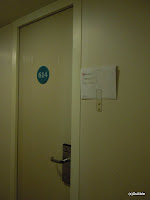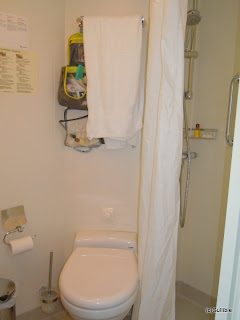Let's Float This Boat
 The main ship for the 1914 Imperial Trans-Antarctic
Expedition has been found and Ernest
Shackleton purchases it for £11,600.
The main ship for the 1914 Imperial Trans-Antarctic
Expedition has been found and Ernest
Shackleton purchases it for £11,600.
Originally built for tourism in the Arctic, the
Norwegian-built Polaris becomes available
when the tourism plan fails. She is
arguably the toughest wooden ship every built for polar conditions. At 144 feet long, with a 25 foot beam, her keel is
four pieces of solid oak, providing a thickness of 85 inches.
Her hull varies between 30 inches and 18 inches thick. Extra-special attention was paid in forming
her bow, which when completed was 52 inches thick, with each timber selected
from oak trees with natural shapes that followed the curve of her design.
She carries three masts and a coal-fired steam engine with
350 horsepower. The engine alone can
propel her at speeds up to 10.2 knots (11.6 mph).
Opinion of the day holds that the strength of the ship equals
if not surpasses the Fram, which
Roald Amundsen used in his successful expedition to reach the South Pole. There is a notable difference, however, one
that would become significant.
The Fram’s hull
was bowl-shaped, allowing it to ride up when ice formed around it. The Polaris
is designed to operate in loose pack ice, and will not rise when compressed by
ice.
Shackleton is now set to sail. He renames the ship Endurance, after his family’s motto, Fortitudine vincimus. Translated from the Latin, it means “By
endurance we conquer.”
Manned and loaded with supplies, provisions for men and
dogs, and crew, Endurance departs Plymouth,
England, August 6, 1914. Captain Frank Worsley
sets a course for Buenos Aires. It will
take two months to get there.
Shackleton remains in England, wrapping up last minute
chores. He will travel to Argentina on a
regular mail/passenger ship to meet the Endurance and finish supplying her.
| The Endurance. Photo by Frank Hurley |
***
 |
Finally, finally, the day for boarding the Fram arrives. The six buses depart the hotel in Buenos
Aires in fifteen minute intervals and soon arrive at the very busy commercial dock. The intervals are an attempt to avoid long
lines. It doesn’t work.
We enter the port building and line up behind those who
arrived earlier. We pass through passport
control and security, police and security dogs watching. Then we line up to wait for the port shuttle
buses to take us through rows of cranes and connex shipping containers, where
we line up to board our ship.
 |
| Waiting to board. |
 |
| Waiting for our ID cards. |
 |
| The staircases on the ship. |
Up the gangplank we go, line up to pass through metal
detectors, and pack the lobby to wait until someone at the desk is available to
take our photo and give us another lanyard with a plastic card. This card is our room key and credit card to
use on the ship. It will be scanned each
time we get off and back on the ship.
Our first assignment is to go up a deck to the lounge on the
port side where we will be issued our parkas.
They turn out to be exceptionally well-made, beautiful blue
water-resistant windbreakers with hoods.
I love them immediately, not only for their color and quality, but for
the words printed on the back:
Greenland, Antarctica, Spitsbergen, Norway.
 |
| In my lovely blue parka. |
These are the areas where the Fram operates.
I stop by the main desk and register my credit card (not the
ship card). All of my on-board purchases
will be charged to this card before I leave the ship at the end of the trip.
 |
| Our cabin, number 614 |
I grab cameras and head for an outside deck. Unfortunately we aren’t allowed out until we receive
lifeboat drill, so we gather in the lobby on Deck Five and wait until the crew
is ready. And wait.
 |
| The only departure shot of the city I could get. |
The ship departs Buenos Aires, heading down the long estuary of the Rio de la Plata to the Atlantic Ocean. No photos of the departure because the
adamant lady at the door won’t let me out.
I snap one picture out a window.
Life boat drill consists of being shown how to don
life-saving gear, though both the young lad following the lead of another out
of my sight do it in the wrong order. I
keep my mouth shut, but I am aware that in Antarctic waters, that thin little
nylon suit won’t be of much help.
Then, it’s time for lunch and ship-exploring before a
late-afternoon Captain’s welcome.
In between there’s an orientation lecture and time for a
nap.
 |
| The other end of our cabin. |
 |
| Part of the bathroom. |
 |
| Toilet and shower. |
The modern-day Fram
flies the flag of Norway. She is about 350 feet
long, 62 feet wide, and has a service speed of 13 knots. There are 128 cabins with a passenger
capacity of 318. On this special trip, there are 231 Vantage Travel passengers.
There are eight decks, with the waterline at Deck One. Deck Two is a service deck, where the landing craft
are located and other facilities for the operation of the ship.
 |
| Front row of seats in the observation lounge. |
 |
| Deck Six, rear observation deck. |
 |
| Sitting area and front desk. |
 |
| Framheim lecture hall. |
 |
| The 24-hour snack bar. |
 |
| Arcade where we line up for the dining room. |
 |
| The bridge. |
 |
| The Captain and the crew. |
 |
Deck Three: mostly
passenger cabins.
Deck Four: Front
desk, dining call, café, sitting areas, and two lecture halls.
Deck Five: Cabins and a Promenade deck with access to the
bow for viewing.
Deck Six: Cabins and
access to the bridge
Deck Seven: Observation
lounge, fitness room, hot tubs, rear exterior deck.
Deck Eight:
Half-length deck with saunas and exterior observations areas.






Wonderful .. keep them coming ..smiles from cap and patti
ReplyDeleteThis boat is exactly like the Hartigruten boat we were on when we sailed along the coast of Norway.What a wonderful experience you are having.
ReplyDeleteDespite lots of standing in line, lots of waiting, and aggravation of not being able to get departing shots of Buenos Aires, it amazes me that ships filled with people are making voyages all over the planet with relatively few incidents. I appreciate the detail of the cabin interiors, et al.
ReplyDelete